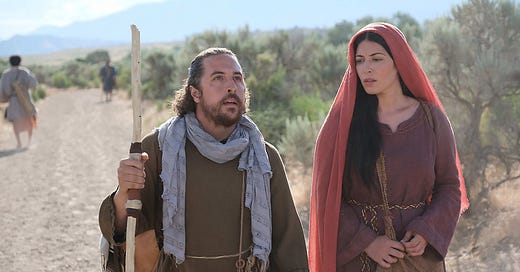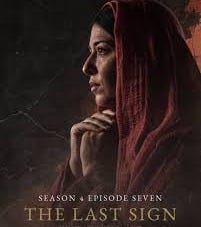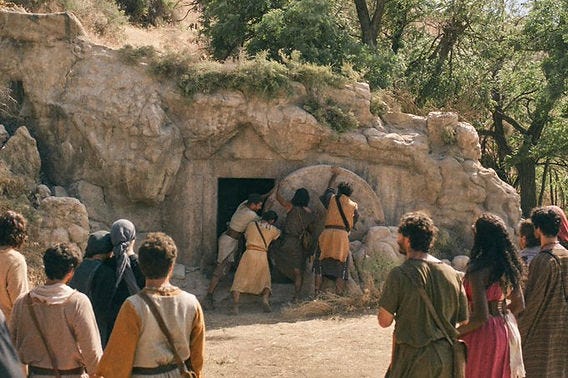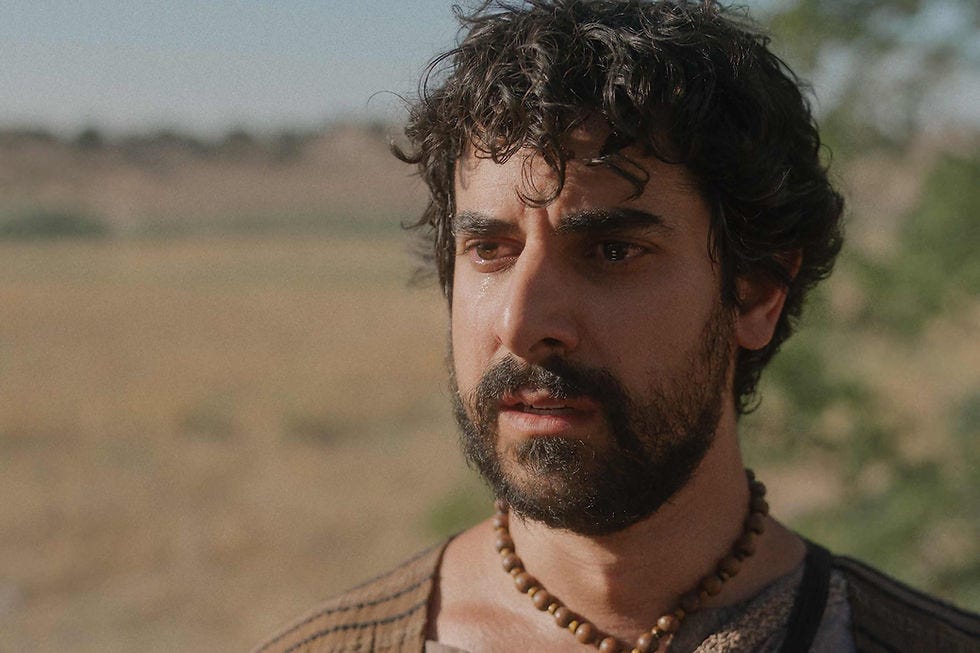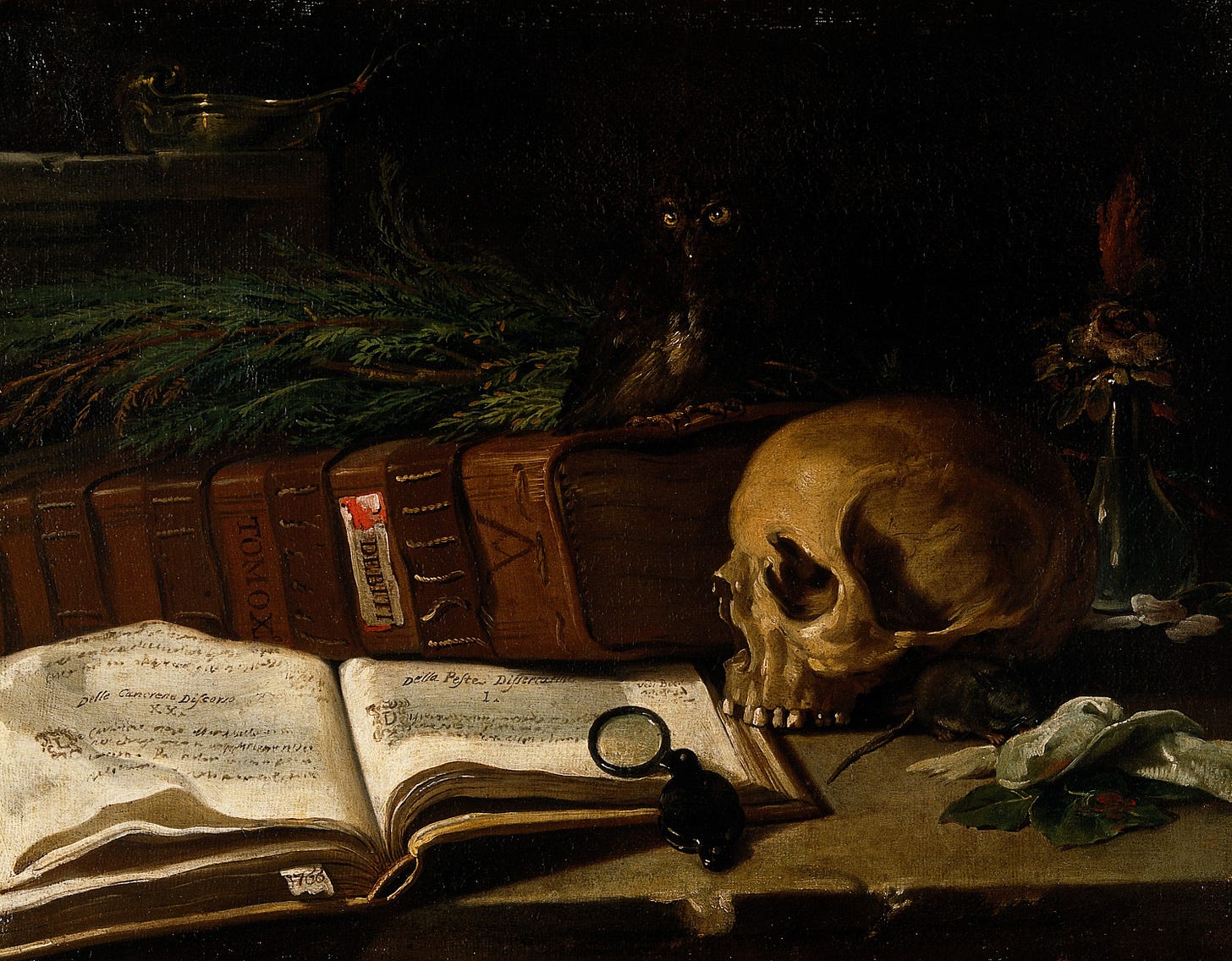Summary
Before the opening credits roll in episode 7, we experience an incredible flash forward scene. A visibly aged Matthew visits Mary Magdalene at her hideout in the caves of Gaul, or modern day France. Matthew has finished writing his Gospel and wanted to be with Mary as she is the first to read it. He also brought news of the death of Little James in lower Egypt. The two friends enjoyed a meal together and reflected on the journey they shared. Matthew noticed that Mary has also written and inquired about what she may have recorded. She confessed that she had dreams, specifically about some of the darker times. Matthew gently encouraged Mary to share and she agreed but the credits begin before we find out more.
Jesus and the disciples departed the inn in Perea where they stayed to celebrate Hanukkah. A few were still injured from the altercation in Jerusalem, and many are confused about what they may experience once they reach Mary and Martha’s home. Along the walk, there are several important conversations. Thomas and John discuss death. Big James asked Peter if he told everyone about Jairus’s daughter and hoped that secret wouldn’t need to be kept for long. Judas confided in Nathaniel about his frustration and concerns. He believes the ministry is failing. Mary Magdalene and Little James reflected on Psalms of David, pondered suffering, exchanged unanswerable questions, and their journeys with Jesus.
In Bethany Mother Mary comforted Martha and Mary while they grieved and hosted mourners. The family lawyer arrived and gave Martha the message that, “He is coming.” She greeted Jesus and the disciples at the gate. Jesus told her that Lazarus will rise and she professed her faith in Him. Martha ran to get Mary while Jesus and the disciples waited at the gate. The crowd of mourners followed Mary, Martha, and Mother Mary to the eastern gate. Mary fell to Jesus’s feet weeping. Having seen the grief and hurt all around Him and perhaps knowing the pain waiting them all very soon, Jesus wept as well. The three women comforted Jesus then they all proceeded to the tomb of Lazarus.
At the tomb, Jesus asked the crowd to remove the stone. Simon Z, Andrew, Peter, and Zebedee rolled away the enormous stone. An obvious stench came over the crowd. Jesus looked to heaven and spoke to His Father then raised His hand, commanded Lazarus to come out, and he did. The reactions from the crowd were intense. The sisters were overcome with joy, an angry Sadducee departed for Jerusalem, some were frightened, others came to believe in amazement, and Thomas was devastated. After Jesus greeted his old friend, the sisters took him home and the disciples asked the crowd to disperse.
Big James asked Jesus why He wasn’t telling the crowd to keep this miracle a secret. Judas felt empowered . Thomas, collapsed and pleaded, “What have you done?'“ He cannot hold back his anger and begged Jesus to answer him why. Jesus dropped to His knees in front of Thomas.
“Thomas, I don’t expect you to understand now, I don’t. What the Father allows, what I allow, in order to bring about my Father’s will, and the faith and growth of His church, it can be crushing for you. And yes, even for me.
“It’s too much. It’s too much. I don’t understand.”
“I know and that hurts my heart. But please, please stay with me, Thomas and you will understand in time.”
Jesus told the lawyer and business partner that He knew a Sadducee was in the crowd and would report back to Jerusalem. The disciples helped Thomas up and returned to town. Mary Magdalene approached the tomb and peered in with wonder and foreboding.
Back at the house Jesus asked to have a moment alone with Lazarus. The sisters, Mary and Martha, sat at the dining table and remarked on their unbelievable day. Mary pointed out that Martha was relaxed instead of busying herself with the mess of their home. They discussed their inability to repay Jesus and Mary seemed to find an answer as she pulled the key to the safe from her pocket.
Lazarus and Jesus sat across from one another and Lazarus asked "why me.” Jesus told Lazarus that He is out of time. Raising him from the dead would be Jesus’s final public miracle. Jesus told Lazarus about the attempted stoning in Jerusalem. Lazarus was upset but Jesus asked him to just listen. Jesus admitted how painful it was for Him to allow Lazarus to die and wait to raise him for four days. Jesus also confessed His frustration with His followers for “missing it”, His anger with the religious leaders, and His dread for His passion that is to come. Lazarus was afraid. They discussed the prophet Isaiah, and Lazarus said, “they were just words on a scroll, now that they are about you, flesh and blood, it’s another story.” Jesus replied, “A story nearing its end.” Their conversation ended when confrontation arose in the courtyard.
Thomas smashed jars and yelled at the disciples. Philip told Thomas, “There is no use putting suffering on a scale and weighing it.” Judas inserted himself in the discussion to again express his excitement for the shift in mission. The other disciples were much more cautious and apprehensive about what had changed. The disciples were angry and divided. Little James crumpled under his pain. He insisted that he is fine, the women urged the Apostles to go to bed, and each of them headed to their rooms and to gather Thomas and John. While they waited with Little James, Mary Magdalene and Thaddeus expressed their grief and acknowledge that “soon” has come.
Back in the cave, Mary Magdalene read her beautiful reflections to Matthew as the consequences of the day began to unfold in Jerusalem and Bethany.
Megan’s Insight
The beautiful piece read by Mary Magdalene at the end of this episode is fictional, written by show co-writer Tyler Thompson. While this piece was created for the show, there is ancient text called the Gospel of Mary, often attributed to Mary Magdalene. It was discovered in 1896 by a German diplomat named Carl Reinhardt at a bazaar in Cairo. The Catholic Church considers this document heretical and fraudulent. It was written long after the death of Mary Magdalene and contains teachings contrary to the Catholic Church, therefore it cannot be a canonical book. With that being said, it is completely in the realm of possibility that a disciple of Jesus Christ would have written prayers or psalms for their own reflections. It is important to remember that this poem is not biblical but that does not detract from its beauty, in my opinion.
Mary’s suffering prior to meeting Jesus was immense. Because of her past I believe she is able to understand Jesus in a way the other disciples cannot. I love that the writers chose to use Mary Magdalene in this scene to bring us all closer to the heart of Jesus as we approach His passion in this series. There is so much bitter and sweet in Mary’s psalm, and it was hard to catch it all while watching the aftermath scenes play out. Take a moment to read through it below.
Darkness is not the absence of light. That would be too simple. It is more uncontrollable and sinister. Not a place, but a void. I was there once. More than once. And although I could not see or hear you, you were there. Waiting. Because the darkness is not dark to you. At least, not always. You wept, not because your friend was dead but because soon you would be. And because we couldn’t understand it, or didn’t want to, or both. The coming darkness was too deep for us to grasp. But, then, so is the light. One had to come before the other. It was always that way with you. It still is. Tears fell from your eyes, and then ours, before every light in the world went out. And time itself wanted to die with you. I go back to that place sometimes, or rather, it comes back to me uninvited. The night what was eternal until it wasn’t. Bitter, and then sweet. But somehow the bitter remained in the sweet and has never gone away. You told us it would be like that. Not with your words, but with how you lived. The man of sorrows, acquainted with grief. That grief wasn’t what we wanted to see so we tried to look away, and in so doing fulfilled your very essence. ‘One from whom people hide their faces.’ But soon we couldn’t hide from it any more than we could stop the sun from setting. Or rising. I remember you wish there could be another way. And looking back, I do too. I still don’t know why it has to be this way. The bitter often mingled with the sweet. Maybe I never will. At least, not on this side of…
This episode is based heavily on Isaiah 53. We hear direct references in the private conversation between Lazarus and Jesus as well as in Mary’s psalm. Jesus was fully human. As I mentioned in the Episode 5 review, Jesus was a 200% person, 100% human and 100% God. I really love that the biblical experts point out Jesus felt emotions even deeper than we do in the Episode 5 Bible Roundtable. He was not desensitized to emotion by sin in the same way we are. Isaiah 53:3 says that He knew pain. I think it’s easy for us to be confused by John 11:35, “And Jesus wept.” but we cannot project our limited understanding to this verse.
Mitchell’s Insight
Memento Mori
Death. The last enemy. It is an enemy that God never intended for us and only came about through the actions of our original parents, and it breaks our Father’s heart as displayed in the tears of the Son. But, no enemy of God can overcome Him. There is no evil that God cannot create a greater good from. So, Lazarus’s death and restoration brings Thomas to his knees and has Judas shouting for joy. They are both correct and terribly wrong. Neither understands that this resurrection is not sufficient of a remedy for the introduction of death to the world for Lazarus must die again, someday.
The title of this episode is The Last Sign. Signs point to things. They are not the thing that is important. They point us to the thing that is important. If we stop at the raising of Lazarus, we fail to reach what it was pointing us towards. The Resurrection of Our Lord will be the conquering of death that God has planned to defeat the consequences of original sin. The gift of His Resurrection will be given to Lazarus and to Ramah and to Thomas. The gift more than makes us for the suffering and pain endured by all of them. But this is only true because the gift of the Resurrection is paid for by the horror of the Crucifixion. Our Lord will endure pain and suffering and the last enemy, death, and through this atrocity give us the greatest gift we will ever receive. This review is being posted just following Halloween, All Saints’ Day, and All Souls’ Day. In the modern secular and liturgical calendar, there is not a more appropriate time for Memento Mori. Remember you will die, and after that, remember what Jesus offers.
Michael’s Insight
After Jesus asks where Lazarus has been laid to rest, He looks around at the faces of His mother and His friends, and begins to weep. Jesus is overcome with emotion in this moment, aware that this will be the final action that will set off the chain of events that leads to His death. And looking around at the people He loves, He feels the pain, confusion, and despair that they will feel when He is gone. He also weeps for His mother, being the only person in the group that fully comprehends what is going to happen to Him when they reach Jerusalem. He weeps for the turmoil that He knows Thomas is going to be plunged into when Lazarus is raised. And finally, He weeps for the loss of His dear friend Lazarus. Even though He knows that Lazarus will be raised, He weeps for the pain and suffering that Lazarus had to endure, and the distress and grief that Martha and Mary had to go through over the last few days.
Even though technically The Passion of the Lord begins with the agony in the garden, this is really where you could consider to be the beginning of the Lord’s passion. Passion comes from the Latin word Patior, “to suffer, to bear, to endure”. This is the beginning of His suffering. From suffering His rejection by the religious leaders, to giving His last teaching to His disciples at the Passover feast, to being abandoned by His friends, and finally to His torture and execution, Jesus knows the time has come to fulfill his mission.
Take to Prayer
When have you found yourself under the crushing weight of the world? When have you cried out like Thomas, “it is too much”? Invite Jesus to show you where He was in that place. Like Mary said, you might not have been able to hear or see Him, but He was there with you in the darkness.
Bible Verses
Songs of David mentioned by Little James - Psalm 13:1-6
Man of Sorrow - Isaiah 53: 1-12
The Raising of Lazarus - John 11: 1-44

